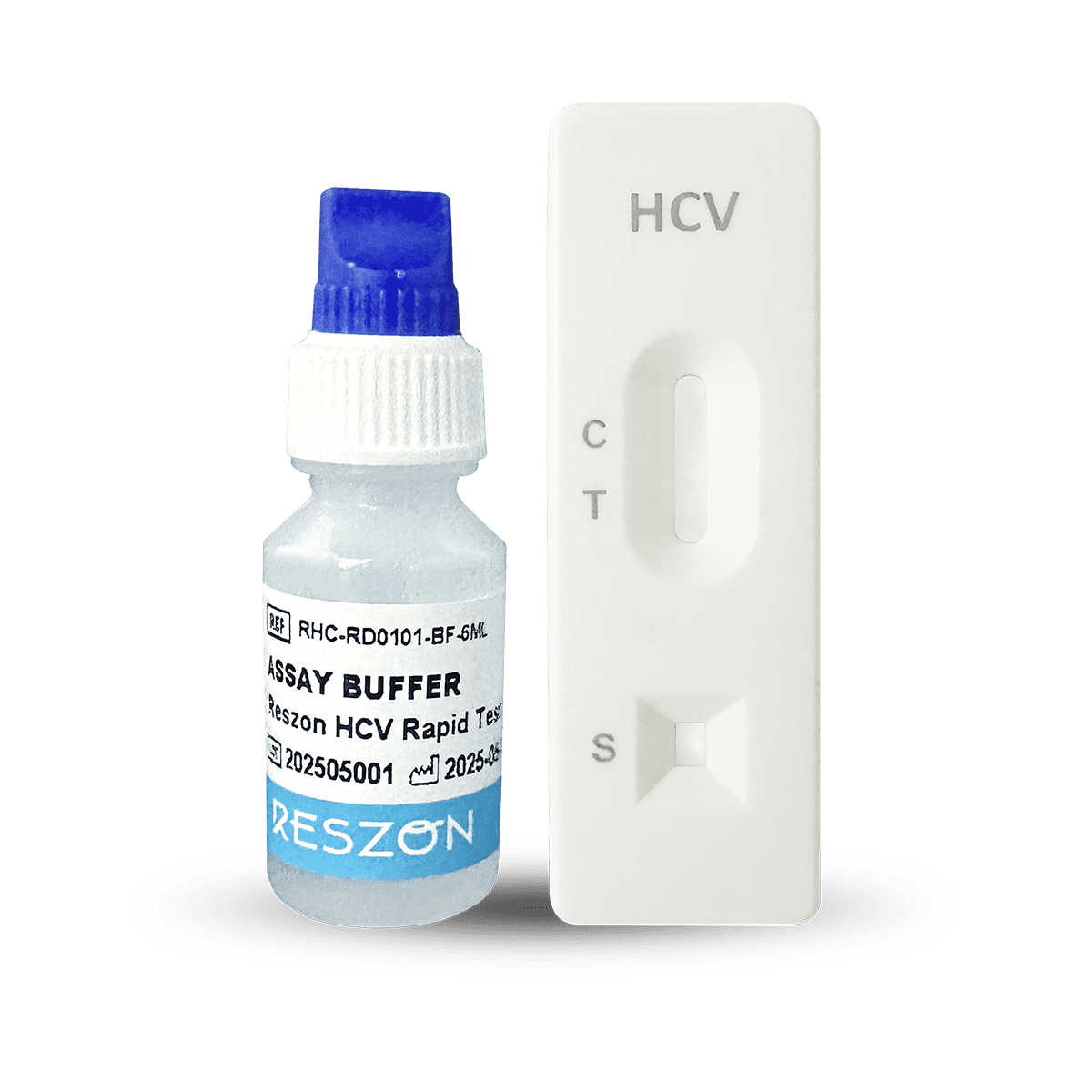RESZON® HCV RAPID TEST
MDA Registration Number: IVDD10681325-211023
- Rapid immunochromatography assay for qualitative detection of antibody to Hepatitis C Virus
- Specimen: Human whole blood, serum, plasma
- Fast result in 20 minutes
- Simple to perform & no special equipment required
For professional in vitro diagnostic use only
SPECIFICATION
| Platform | Immunochromatographic Assay |
| Format | Cassette |
| Detection | Specific antibodies to Hepatitis C Virus (HCV) |
| Specimen | Human whole blood, serum & plasma |
| Specimen volume | 50 μl (whole blood)
25 μl (serum / plasma) |
| Sensitivity | 98.8% |
| Specificity | 99.1% |
| Storage | 4-30°C |
| Shelf Life* | 24 months |
*From date of manufacture


|
Cat. No. |
Product Description |
Test Specimen* |
Product Format |
Intended Use |
Intended Use |
Storage Temp. |
Packing Size |
|---|---|---|---|---|---|---|---|
|
RHC-RD0101-25 |
RESZON® HCV Rapid Test |
S/P/WB |
Cassette |
Detection of specific antibodies to HCV |
For Professional Use |
4-30oC |
25 T/ Kit |
|
RHC-RD0101A-25 |
RESZON® HCV Rapid Test |
S/P/WB |
Cassette |
Detection of specific antibodies to HCV |
For Professional Use |
4-30oC |
25 T/ Kit |
|
RHC-RD0101B-25 |
RESZON® HCV Rapid Test |
S/P/WB |
Cassette |
Detection of specific antibodies to HCV |
For Professional Use |
4-30oC |
25 T/ Kit |
* S – Serum; P – Plasma; WB – Whole Blood; T – Test
Frequently Asked Questions (FAQ)
What is RESZON HCV Rapid Test used for?
The RESZON® HCV Rapid Test is a diagnostic tool used to detect antibody to Hepatitis C Virus (HCV) in human whole blood, serum or plasma specimens. It helps identify current Hepatitis C virus (HCV) infection.
How does the test work?
The test is based on immunochromatography. If HCV is present in the sample, it will bind to specific antibodies in the test, producing a visible line on the strip.
How is Hepatitis C Virus (HCV) transmitted?
HCV is mainly transmitted through blood:
- Blood-to-blood contact – sharing needles or other drug-injection equipment, unsafe medical injections, or blood transfusions where screening is not performed.
- Healthcare exposures – needlestick injuries.
- Less common routes – sexual transmission (generally low risk) and mother-to-child transmission (lower rate than HBV).
Reference: https://www.who.int/news-room/fact-sheets/detail/hepatitis-c
Why should you get tested for HCV?
Left untreated, chronic hepatitis C can cause serious health problems, including liver damage, cirrhosis, liver cancer, and even death. Many people do not have symptoms, so testing is the only way to know if you have hepatitis C.
Who should get tested for HCV?
- All adults 18 and older at least once in their lifetime.
- Pregnant women, during each pregnancy.
- People who currently inject drugs, or even did so once or long ago.
- People who have human immunodeficiency virus (HIV).
- People with abnormal liver tests, liver disease, or who are on hemodialysis.
- People who received blood or organ donations before July 1992.
- People who received clotting factor concentrate before 1987.
- Health care, emergency medical, and public safety personnel after needle sticks, sharps, or mucosal exposures to hepatitis C virus (HCV)-positive blood.
- Infants and children born to people with known HCV infection.
What sample type is required?
Human whole blood, serum, or plasma.
How soon can I test after exposure to HCV?
HCV may appear in the blood 4 to 10 weeks after exposure. If you test too early, the result may be negative even if infected.
How long does it take to get results?
The test provides results within 15–20 minutes.
What does a positive result mean?
A positive result means the person has been exposed to HCV at some point and developed antibodies. It does not confirm an active infection. Further testing, nucleic acid test (NAT) for HCV RNA is needed to determine if the virus is still present.
What does a negative result mean?
A negative result usually means the person has not been infected with HCV. However, if exposure was recent (within the last 6 months), antibodies might not be detectable yet. A follow-up test may be recommended.
Do I need to prepare before the test?
No special preparation is needed. You can eat and drink normally before the test.
Is the test painful?
Only a small finger prick or blood draw is required. Any discomfort is minimal and short-lived.



